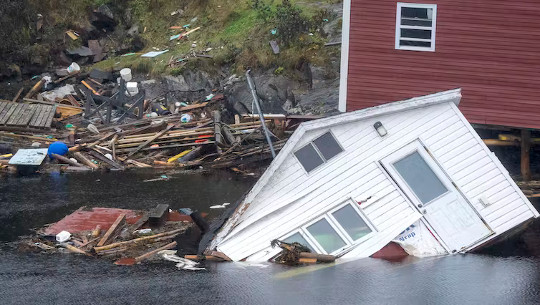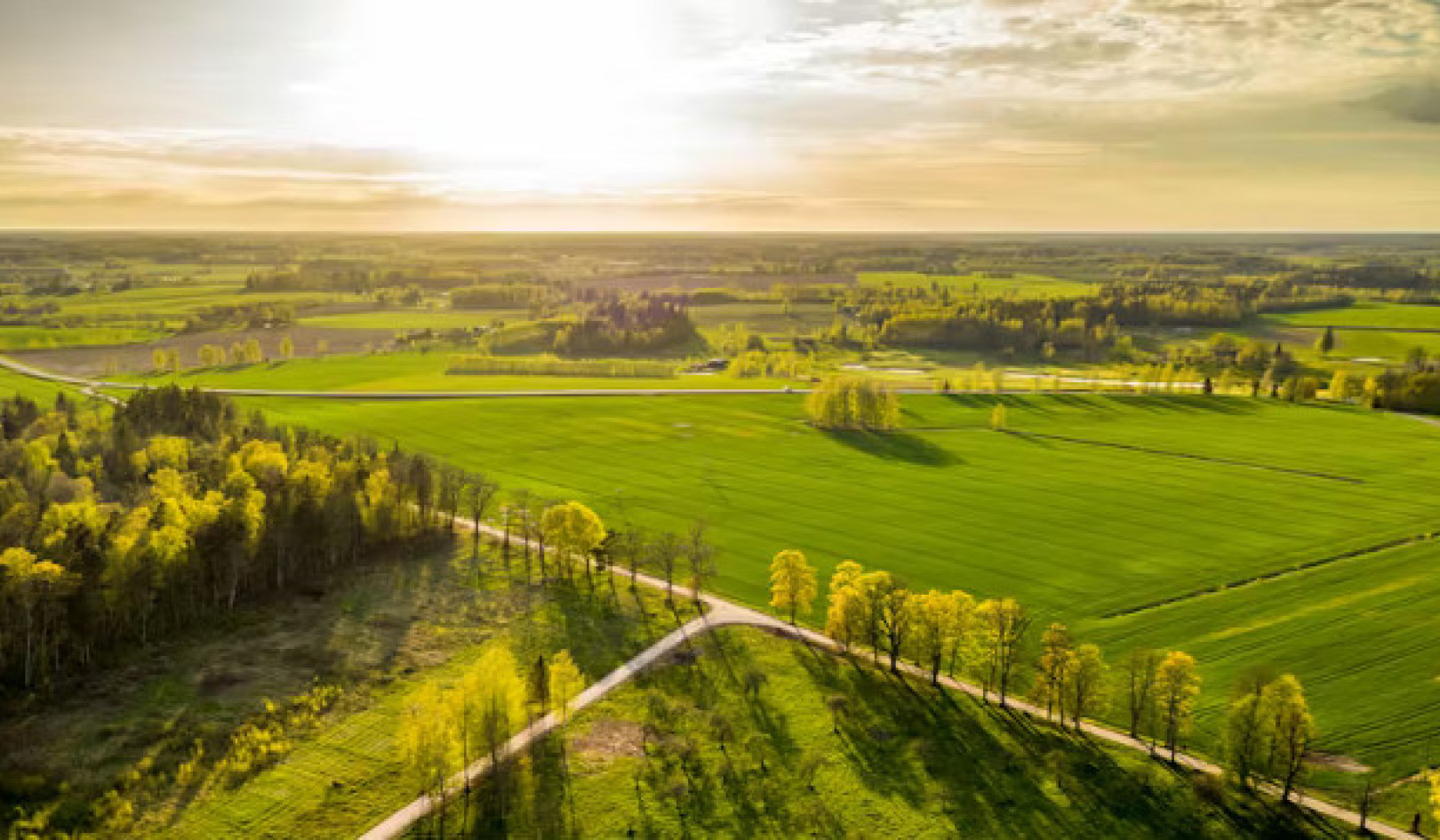
Buildings sit in the water along the shore following Hurricane Fiona in Rose Blanche-Harbour Le Cou, Nfld. Fiona left a trail of destruction across much of Atlantic Canada. THE CANADIAN PRESS/Frank Gunn
We have damaged our planet through destructive exploitation of fossil fuels and the insatiable demand for things we don’t need. We are cooking ourselves to death and it may already be too late to do anything about it.
Multiple and intersecting crises — the pandemic, a changing climate, wars in Ukraine and elsewhere and associated economic sanctions — have produced real hardship for millions of people. The effects include food shortages, hunger, inflation, recessions and soaring energy costs that undermine climate action as coal-fired generation resumes.
Economically, wealth inequality is unprecedented. The poorest half of the global population hardly owns any wealth, just two per cent of the total. The richest 10 per cent of the global population own 76 per cent.
Yet we continue to believe that the marketplace, left mainly to self-regulate, will naturally stabilize economies. That belief has led to unlimited growth and minimal intervention by governments to resolve staggering inequity or even to manage the economy at all.
Existential crises
These are genuine existential crises. Climate change could end human life on Earth. Wars and conflicts, as bad as they already are, could swiftly escalate.
Any of these crises could trigger a horrible spill of dominoes. For example, war accelerates climate change, which pulls down the economy and potentially accelerates the death of democracy. I explore such possibilities in my new book Escaping Dystopia.
Few have confidence that existing political leaders and institutions will find solutions. There is enormous and often unarticulated dissatisfaction with how things are going and who is making decisions.
Voting and participation in politics are down. The 2022 election in Ontario, for example, saw just 18 per cent of eligible voters electing a two-thirds majority government.
In an Ipsos survey covering 27 countries, more than 70 per cent of respondents said they believed their economies were controlled by the wealthy and more than 50 per cent said their own countries were broken.
Often considered the world’s most stable democracy, the United States is teetering badly, up to its neck in lies, manipulation, hypocrisy and greed. Its institutions are paralyzed by toxic partisanship, the streets are awash with combat weapons and racism has again reached levels so poisonous that some feel emboldened to express abhorrent views openly.
Equally troubling is that in the neoliberal era, many decisions are taken out of politics and moved into the realm of agencies that are at arm’s length from governments or embedded in remote international organizations like the European Union, or in trade treaties.
What’s left for governments to manage is not unimportant, but it’s a minor part of what they should be dealing with in democratic societies.
Glimmers of hope
All this points to a lack of representation and accountability, as well as the need for radical changes to our institutions and politics.
Avoiding catastrophe must involve devising new institutional structures that can achieve the goals of representation and accountability in new and effective ways based on the roles people play in society — whether they’re workers, farmers, business owners or caregivers, for example — and on their lived experiences.
But can the resistance of the privileged be overcome?
Before you start building an off-grid home in the woods, there are some causes for hope.
Consider the last century or so. As we look back, it’s clear that change is constant. Sometimes, it’s incremental. Other times it’s dramatic and radical. Although there are no guarantees about what direction change will take, things can change for the better, even when they seem lost.
Examples include the post-Second World War process of decolonizing European empires, achieving universal social programs in many countries and important gains in civil rights.
People potentially have more power than they might realize. Expressions of specific discontent could expand into demands for more comprehensive change.
In Chile, for example, a popular protest against higher subway fares led to demands for an entirely new constitution. Although the draft of a new constitution was defeated in a referendum, constitutional change remains on the agenda. The process continues.
And while the final result of the Brazilian presidential election remains to be determined, the first round victory of the left candidate shows a strong desire for change.
Returning to ‘normal’ not an option
What should change look like? The desire to return to pre-pandemic “normal” is powerful, but “normal” is what got us where we are today.
Various reforms have been proposed, such as the Green New Deal, modelled on Franklin D. Roosevelt’s 1930s reforms that helped to end the Great Depression. Then, circumstances were sufficiently desperate to make reform possible.
Others argue that more radical reforms based on planning and a rejuvenated public domain are needed today.
Are we there yet? Will climate and other crises be enough to prompt action? Have geopolitical and economic crises reached the stage where radical change is inevitable? We’ll see.
But getting back to normal and trusting existing institutions and markets to solve our problems is not a viable option.![]()
About The Author
Stephen McBride, Professor and Canada Research Chair in Public Policy and Globalization, McMaster University
This article is republished from The Conversation under a Creative Commons license. Read the original article.
Recommended books:
Capital in the Twenty-First Century
by Thomas Piketty. (Translated by Arthur Goldhammer)
 In Capital in the Twenty-First Century, Thomas Piketty analyzes a unique collection of data from twenty countries, ranging as far back as the eighteenth century, to uncover key economic and social patterns. But economic trends are not acts of God. Political action has curbed dangerous inequalities in the past, says Thomas Piketty, and may do so again. A work of extraordinary ambition, originality, and rigor, Capital in the Twenty-First Century reorients our understanding of economic history and confronts us with sobering lessons for today. His findings will transform debate and set the agenda for the next generation of thought about wealth and inequality.
In Capital in the Twenty-First Century, Thomas Piketty analyzes a unique collection of data from twenty countries, ranging as far back as the eighteenth century, to uncover key economic and social patterns. But economic trends are not acts of God. Political action has curbed dangerous inequalities in the past, says Thomas Piketty, and may do so again. A work of extraordinary ambition, originality, and rigor, Capital in the Twenty-First Century reorients our understanding of economic history and confronts us with sobering lessons for today. His findings will transform debate and set the agenda for the next generation of thought about wealth and inequality.
Click here for more info and/or to order this book on Amazon.
Nature's Fortune: How Business and Society Thrive by Investing in Nature
by Mark R. Tercek and Jonathan S. Adams.
 What is nature worth? The answer to this question—which traditionally has been framed in environmental terms—is revolutionizing the way we do business. In Nature’s Fortune, Mark Tercek, CEO of The Nature Conservancy and former investment banker, and science writer Jonathan Adams argue that nature is not only the foundation of human well-being, but also the smartest commercial investment any business or government can make. The forests, floodplains, and oyster reefs often seen simply as raw materials or as obstacles to be cleared in the name of progress are, in fact as important to our future prosperity as technology or law or business innovation. Nature’s Fortune offers an essential guide to the world’s economic—and environmental—well-being.
What is nature worth? The answer to this question—which traditionally has been framed in environmental terms—is revolutionizing the way we do business. In Nature’s Fortune, Mark Tercek, CEO of The Nature Conservancy and former investment banker, and science writer Jonathan Adams argue that nature is not only the foundation of human well-being, but also the smartest commercial investment any business or government can make. The forests, floodplains, and oyster reefs often seen simply as raw materials or as obstacles to be cleared in the name of progress are, in fact as important to our future prosperity as technology or law or business innovation. Nature’s Fortune offers an essential guide to the world’s economic—and environmental—well-being.
Click here for more info and/or to order this book on Amazon.
Beyond Outrage: What has gone wrong with our economy and our democracy, and how to fix it -- by Robert B. Reich
 In this timely book, Robert B. Reich argues that nothing good happens in Washington unless citizens are energized and organized to make sure Washington acts in the public good. The first step is to see the big picture. Beyond Outrage connects the dots, showing why the increasing share of income and wealth going to the top has hobbled jobs and growth for everyone else, undermining our democracy; caused Americans to become increasingly cynical about public life; and turned many Americans against one another. He also explains why the proposals of the “regressive right” are dead wrong and provides a clear roadmap of what must be done instead. Here’s a plan for action for everyone who cares about the future of America.
In this timely book, Robert B. Reich argues that nothing good happens in Washington unless citizens are energized and organized to make sure Washington acts in the public good. The first step is to see the big picture. Beyond Outrage connects the dots, showing why the increasing share of income and wealth going to the top has hobbled jobs and growth for everyone else, undermining our democracy; caused Americans to become increasingly cynical about public life; and turned many Americans against one another. He also explains why the proposals of the “regressive right” are dead wrong and provides a clear roadmap of what must be done instead. Here’s a plan for action for everyone who cares about the future of America.
Click here for more info or to order this book on Amazon.
This Changes Everything: Occupy Wall Street and the 99% Movement
by Sarah van Gelder and staff of YES! Magazine.
 This Changes Everything shows how the Occupy movement is shifting the way people view themselves and the world, the kind of society they believe is possible, and their own involvement in creating a society that works for the 99% rather than just the 1%. Attempts to pigeonhole this decentralized, fast-evolving movement have led to confusion and misperception. In this volume, the editors of YES! Magazine bring together voices from inside and outside the protests to convey the issues, possibilities, and personalities associated with the Occupy Wall Street movement. This book features contributions from Naomi Klein, David Korten, Rebecca Solnit, Ralph Nader, and others, as well as Occupy activists who were there from the beginning.
This Changes Everything shows how the Occupy movement is shifting the way people view themselves and the world, the kind of society they believe is possible, and their own involvement in creating a society that works for the 99% rather than just the 1%. Attempts to pigeonhole this decentralized, fast-evolving movement have led to confusion and misperception. In this volume, the editors of YES! Magazine bring together voices from inside and outside the protests to convey the issues, possibilities, and personalities associated with the Occupy Wall Street movement. This book features contributions from Naomi Klein, David Korten, Rebecca Solnit, Ralph Nader, and others, as well as Occupy activists who were there from the beginning.
Click here for more info and/or to order this book on Amazon.

























